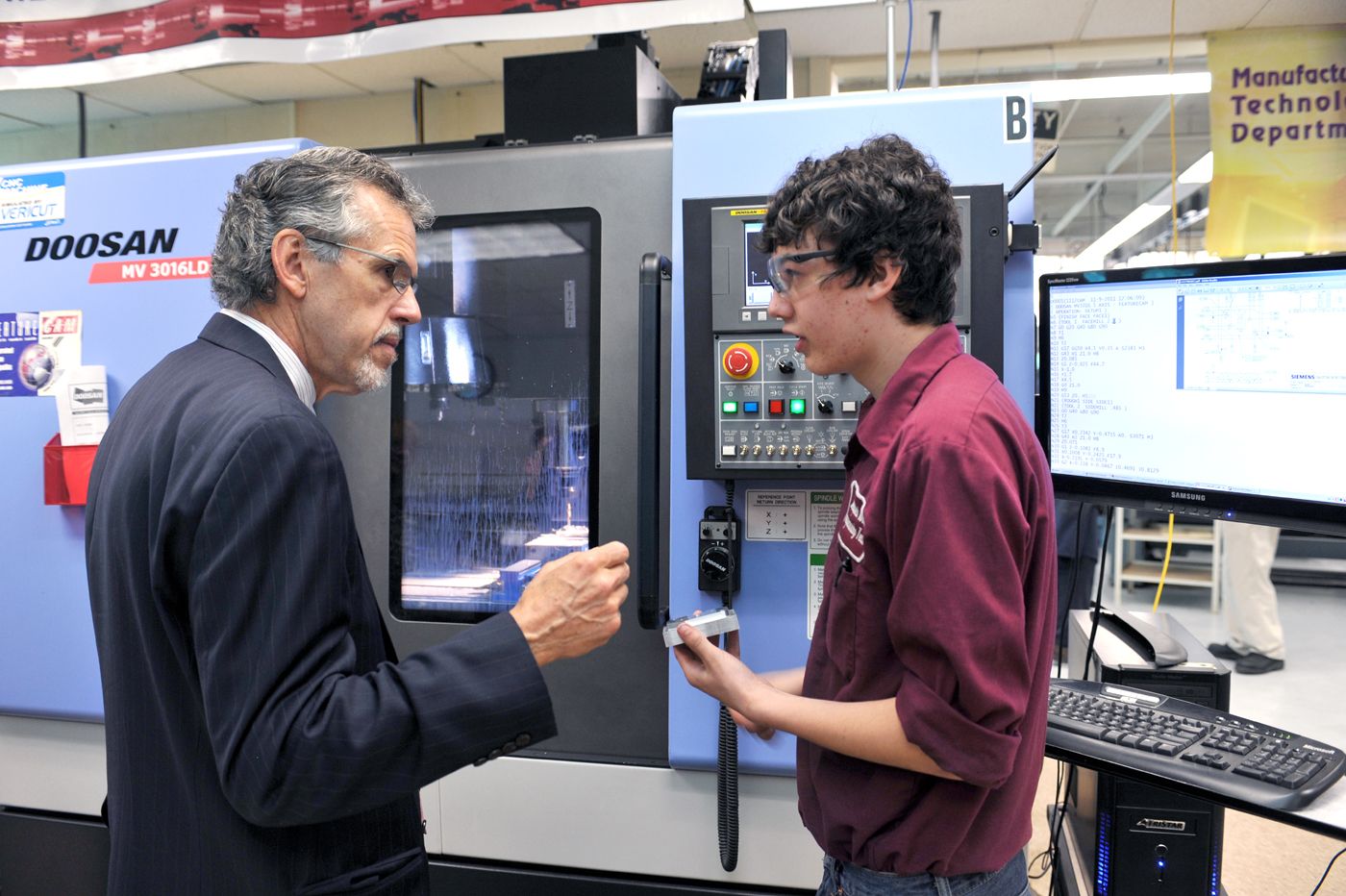By DAN CROWLEY
Daily Hamsphire GAzette
Staff Writer
WESTFIELD – Instructors at four area institutions are relishing the opprtunity to train over 50 unemployed Hampden County residents in the coming months.
Of the nearly $2 million grant announced by Secretary of Housing and Economic Development (HED) Greg Bialecki supporting manufacturing workforce training at last week’s Advanced Manufacturing Collaborative (AMC) Pioneer Valley Summit at UMass-Amherst, $219,960 will be going to the Hampden Regional Employment Board (HREB).
HREB President David Cruise said instructors at Westfield Vocational-Technical High School (WVTHS), Springfield’s Putnam Vocational-Technical High School and two area community colleges will be helping to train workers, with WVTHS Principal Stefan Czaporowski adding that his four instructors who will begin training individuals are looking forward to it.
“One of the benefits of our program is that some schools offer only 80 hours of instruction – ours offers 300,” he said. “The additional hours of instruction prepares our students for the workforce.”
WVTHS manufacturing instructors Gary Nadeau, Ron Nadeau, Jayme Coggin and Lyle Washington will be assisting unemployed adults looking to break into the industry on the basics of manufacturing and it’s technology.
“It’s three nights a week, five hours a night and the candidates go through an interview process,” said Czaporowski. “What’s key about this program is that they (students) can’t miss any days – you have to be committed.”
While veterans of the manufacturing industry stress that the skills required to work in the field cannot be learned overnight, Czaporowski believes skills learned in the 300-hour course will be provide the fundamental working knowledge required to enter a community college or another job training program.
“They’ll actually work on computers for CAD/CAM (computer-aided design and computer-aided manufacturing) and on the CNC (computer numerical control) machines,” he said. “They’re going to basically get exposure to everything in our program.”
“We usually have about 12 students that come through the program at a time and a 300-hour course is a snapshot in understanding material removal, primary machines and an introduction to CNC machines,” said Gary Nadeau, one of the Manufacturing instructors at WVTHS who’s in his 11th year with the department.
Nadeau said the HREB course is modeled after the Western Massachusetts Precision Institute, a four month, daily training course that introduced him and his colleague Ron Nadeau (no relation) to manufacturing.
“It was closer to a 600-700 hour program – three months, every day, eight hours – but we got a good jumpstart,” he said. “I can’t speak to what the other schools do, but we try to emulate that program, which was the place to start in manufacturing in the 70’s, 80’s and 90’s.”
Nadeau believes adult students will get more of their training in the shops they proceed onto after they finish the HREB course and that their advanced maturity will help them grasp concepts, making it easier for their instructors to teach.
“We won’t have to worry about the disciplinary stuff so we can teach a lot more in a shorter period of time,” he said. “All of us are passionate about manufacturing and think it’s excellent to have the opportunity to be able to work with these students.”
“The $220,000 will pay for the instructors and materials that we cover,” he said. “The four instructors rotate and have areas of expertise. It’s cool to know that we’re helping other adults on a new career path.”
While the HREB grant will benefit workers in Hampden County, Bialecki also announced another statewide grant of $747,160 to the Massachusetts Advancement Center Workforce Innovation Collaborative (MACWIC) program last Thursday in Milford, funds which will enable MACWIC to expand testing of manufacturing students and capacity-building among the state’s vocational schools and community colleges to better align instruction with industry needs.
Established in February 2012 to preserve manufacturing knowledge and to execute the transfer of knowledge and critical skills to the current and future workforce through the development of strong manufacturing curriculum, MACWIC works in partnership with workforce training providers, vocational technical high schools, community colleges and universities.
The MACWIC grant will be funded through the Advanced Manufacturing Futures Program at MassDevelopment.
“I am proud of the great work MACWIC has accomplished in aligning classroom instruction with industry needs to better prepare students for careers in manufacturing,” said Secretary Bialecki. “Expanding their work to reach all corners of the Commonwealth will train the talent needed in the industry and strengthen our economy for years to come.”


